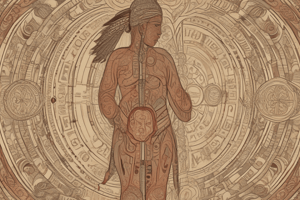Podcast
Questions and Answers
What is the primary focus of the principle of autonomy in medical ethics?
What is the primary focus of the principle of autonomy in medical ethics?
- Doing good to the patient considering individual circumstances
- Providing care regardless of cultural background
- Ensuring cultural competence in healthcare provision
- Respecting patient decisions and actions informed by their culture (correct)
What is the relationship between cultural competence and the four principles of medical ethics?
What is the relationship between cultural competence and the four principles of medical ethics?
- Cultural competence is reflected in all four principles of medical ethics (correct)
- Cultural competence is reflected in the principles of justice and beneficence
- Cultural competence is unrelated to the principles of medical ethics
- Cultural competence is an additional principle of medical ethics
Why is cultural awareness important in healthcare?
Why is cultural awareness important in healthcare?
- To promote alternative medicine practices
- To respect patients' rights and cultural backgrounds (correct)
- To ensure justice in healthcare provision
- To promote autonomy in medical decision-making
What is the primary focus of the principle of justice in medical ethics?
What is the primary focus of the principle of justice in medical ethics?
What is the relationship between cultural background and healthcare rights?
What is the relationship between cultural background and healthcare rights?
What is the primary focus of the principle of non-maleficence in medical ethics?
What is the primary focus of the principle of non-maleficence in medical ethics?
What is the primary reason why healthcare providers should be aware of a patient's cultural background?
What is the primary reason why healthcare providers should be aware of a patient's cultural background?
According to the European Convention of Human Rights, which of the following is a fundamental right?
According to the European Convention of Human Rights, which of the following is a fundamental right?
What is an essential aspect of cultural competence in healthcare?
What is an essential aspect of cultural competence in healthcare?
In the context of healthcare ethics, what is the primary goal of respecting a patient's autonomy?
In the context of healthcare ethics, what is the primary goal of respecting a patient's autonomy?
How does cultural awareness impact healthcare outcomes?
How does cultural awareness impact healthcare outcomes?
What is a key advantage of cultural competence in healthcare?
What is a key advantage of cultural competence in healthcare?
What is the primary reason why acknowledging patients' diversity is important in medical practice?
What is the primary reason why acknowledging patients' diversity is important in medical practice?
In the given scenario, what is the primary challenge the doctor faces in practicing medicine?
In the given scenario, what is the primary challenge the doctor faces in practicing medicine?
What skill should the doctor activate to effectively approach the patient in this scenario?
What skill should the doctor activate to effectively approach the patient in this scenario?
What is the primary ethical implication of this scenario?
What is the primary ethical implication of this scenario?
Can the doctor override the patient's wish to use alternative medicine in this case?
Can the doctor override the patient's wish to use alternative medicine in this case?
How could the doctor apply the principle of respect for autonomy in this case?
How could the doctor apply the principle of respect for autonomy in this case?
What is a key aspect of cultural competence in healthcare?
What is a key aspect of cultural competence in healthcare?
What is the primary reason for considering patients' cultural backgrounds in healthcare?
What is the primary reason for considering patients' cultural backgrounds in healthcare?
What is a common reason why patients may prefer alternative/complementary medicine (CAM)?
What is a common reason why patients may prefer alternative/complementary medicine (CAM)?
How can cultural awareness benefit healthcare providers?
How can cultural awareness benefit healthcare providers?
What is a consequence of cultural incompetence in healthcare?
What is a consequence of cultural incompetence in healthcare?
What is a key aspect of cultural competence in healthcare ethics?
What is a key aspect of cultural competence in healthcare ethics?
What is a potential benefit of considering patients' cultural backgrounds in healthcare?
What is a potential benefit of considering patients' cultural backgrounds in healthcare?
Flashcards are hidden until you start studying
Study Notes
Medical Ethics, Diversity, and Culture
- Acknowledging patients' diversity is important in medical practice to provide culturally sensitive care and respect patients' autonomy, justice, beneficence, and non-maleficence.
Human Rights and Healthcare
- Human rights, such as the right to life, prohibition of torture, and freedom of thought, conscience, and religion, relate to healthcare by ensuring access to healthcare and respecting patients' autonomy and dignity.
- The European Convention of Human Rights outlines specific rights that relate to healthcare, including the right to life and prohibition of discrimination.
Diversity and Culture
- Diversity refers to the unique characteristics that make people different, including cognitive and personality traits, lifestyle, cultural and religious background, sexual orientation, skills, and experiences.
- Culture is a shared framework of values, beliefs, attitudes, and behavior that inform how people live their lives.
- Cultural competence is the ability of healthcare providers to function effectively in the context of cultural differences with their patients.
- The advantages of being aware of patients' cultural background include taking a more accurate history, understanding their perspective, showing understanding, involving them in shared decision-making, establishing a good doctor-patient relationship, and providing care based on the four main principles of ethics.
Four Principles of Medical Ethics
- Autonomy: self-rule, self-determination, thought, decisions, and actions, which are often informed by culture.
- Justice: provision of care regardless of cultural background.
- Beneficence: doing good to the patient, considering individual circumstances and expectations, including cultural background and diversity.
- Non-maleficence: doing no harm to the patient and others, considering patient's background.
Cultural Competence in Practice
- Scenario: a doctor visits a refugee housing and encounters a patient who prefers natural remedies over antibiotics.
- The doctor should activate cultural competence by exploring the patient's perspective, understanding their beliefs, and involving them in shared decision-making.
- The doctor should approach the patient with respect and empathy, considering the patient's cultural background and expectations.
Alternative and Complementary Medicine (CAM)
- CAM involves products and practices that are not part of standard medical care, such as herbal medicine, meditation, acupuncture, and aromatherapy.
- Reasons for using CAM include positive health outcomes, trust, satisfaction, emphasis on the person, and autonomy, dealing with symptoms, and improving quality of life.
Studying That Suits You
Use AI to generate personalized quizzes and flashcards to suit your learning preferences.





